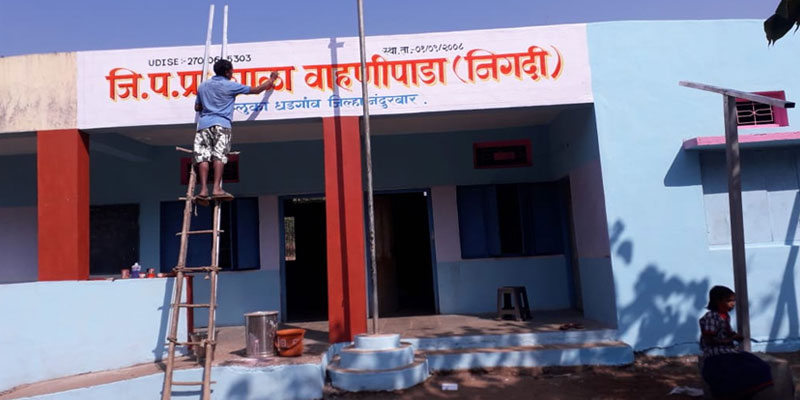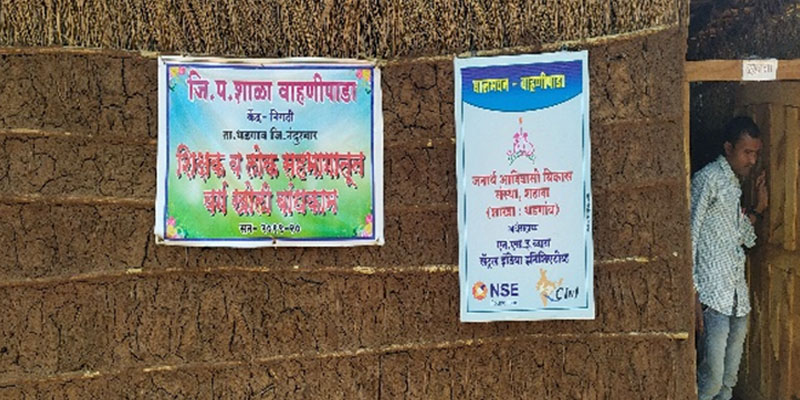
The illiteracy rate in Maharashtra’s Nandurbar district is staggeringly high, at 45%. The tribal block of Dhadgaon, in particular, is among the state’s lowest-performing blocks when it comes to educational development indicators. Dhadgaon also suffers from a high student dropout rate and low transition rates from primary to secondary classes. And when the pandemic struck and schools closed down, the situation considerably worsened.
With pupils being stuck in their respective villages or hamlets, an intervention was necessary. The task of continuing their education was taken up by Collectives for Integrated Livelihood Initiatives, an initiative by the Tata Trusts, in the form of Project Vidya.
Since its 2019 launch, Project Vidya has helped over thousands of young students (from grades 1 to 5) in Dhadgaon block to overcome the technology barrier and learn language and mathematics. The project is supported by the National Stock Exchange Foundation (NSEF) and implemented by the Janarth Adivasi Vikas Sanstha (JAVS).
The Project Vidya team started by conducting preliminary research and developing a two-step plan. Step one was to organise hamlet-based classes across the villages so that the students’ education could continue. Step two involved strengthening School Management Committees (SMCs) and enabling them to provide a healthy, encouraging environment for pupils.
Changing teaching
The Tata Trusts team, along with volunteer teachers or balmitras as they are known, conducted classes in 31 villages and reached out to 2,400 children across 68 hamlets during the course of a year. The community stepped up to support the project by allowing the teachers to conduct classes in their homes as and when necessary.
The teachers conducted child-centric training modules. They communicated with the students in local dialects to ensure better engagement. The teachers also sat for TLMs (Teaching Learning Materials) that taught ways to involve the students and ensure greater interactivity and participation.
The pandemic and lockdowns brought challenges and inconveniences with respect to teaching spaces. Nevertheless, the project was a huge success. The students’ overall performance (on end-of-term tests for the respective subjects) improved by 32% in Marathi, and by 37.5% in Mathematics, over initial baseline assessments.
Community steps up
Project Vidya wouldn’t have been a success without the consistent efforts of the School Management Committees and the teachers involved in the project. The teachers, who were familiar with the respective villages and the students, guided the Project Vidya team members throughout the process and went above and beyond to fulfil their duty as educators.
Take for instance Shildar Bolya Tadvi, the SMC president of Vahanipada hamlet. Mr Tadvi helped the Trusts team to set up a team of workers. The task involved building two classrooms as well as toilets, along with painting classrooms and repairs to the school kitchen and the playground. Mr Tadvi is also one of the several community members who opened their doors to students and provided them space to study.

Then there is Sunita Parmar, a teacher or a balmaitrin who taught at least 60 students during the year and ensured a minimum 50% attendance in her class. An innovative teacher, Ms Parmar engaged her students through fun activities like painting contests, plays, storytelling, etc. She would even follow up on students who missed classes, by visiting their homes to talk to them and their parents.
Ms Parmar’s role in motivating her SMC colleagues to take up school development work enabled the committee to undertake and complete key infrastructure initiatives such as building drinking water facilities, retrofitting toilets, and more.
Dedicated and resourceful teachers like these, and also the SMC and Panchayati Raj Institution(PRI) members who volunteered to distribute masks, sanitisers, and notebooks to students, made the Trusts team’s job much easier.
Today, Project Vidya’s programmes are implemented in 31 government schools and 34 balbhavans across the block, while developmental initiatives have been successfully implemented in 11 schools. Project Vidya is thus enabling the Tata Trusts to realise its goal of providing equal learning opportunities for all.




